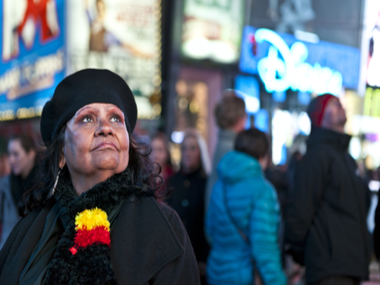BLACK PANTHER WOMAN

Black Panther Woman, Marlene Cummings, looking up in New York
Posted by Jeremy Eccles | 17.06.14
Dates:
01.11.15
: 01.11.15
My interest in the history of Aboriginal activism in Australia is unbounded – so the prospect of the two documentaries selected by Blackfella Films for this year's Sydney Film Festival (SFF) was enticing. Both set in the early 70s when the 1967 Referendum had set minds and hearts free, there was much in the cross-over of Black Theatre and politics in (The Redfern Story) and in the pungent flowering of excess when a tiny local branch of the American Black Panthers was formed in Brisbane (Black Panther Woman) to whet the appetite.
But, just as Darlene Johnson's theatrical doco left me feeling a bit short-changed on the drama side of the equation, so Rachel Perkins's very personal history of a bit-part player in Indigenous politics, which longs to make a really significant point about gender relations in Aboriginal society as a whole, ends up falling between several worthy stools. Throughout, you can see both Perkins and her feisty subject – Marlene Cummings – straining to spit out the story of the “insidious epidemic of mysogyny” in the Black community (as Marlene baldly described the violence she'd suffered over the years after the film's premiere at the 2014 SFF), but somehow it always seems to go off half-cock. Perhaps there's just too much delicate, on-going politics to allow absolute honesty to be recorded for posterity; though both Cummings and the Panthers co-founder Sam Watson were pretty straightforward about it when they weren't being recorded.
So, is it possible that a non-Indigenous director could have cut to the chase more directly? At least s/he would surely have attempted some balance by talking to Dennis/Bejam Walker. For this son of the saintly Oodgeroo/Kath Walker (something that wasn't mentioned in the film) was as much as anyone the subject of this film - the gun-toting co-founder of the Black Panthers in Brisbane and the handsome devil who took in the beautiful17-year old run-away from Cunnamulla, Cummings as lover and junior Pantheress. He should have been given a much better opportunity to speak for himself than the quoted statement that “he disputes Marlene's account of their relationship”.
The only specific, deeply moving reference to the violence she experienced is to Brisbane Murri elders taking Cummings off to a 'party' where she's raped – eliciting her heart-breaking response: “I call you uncle – why do you do that to me?”.
“I stayed quiet about any black man hurting me (at the time),” Cummings says in the documentary. “It’s not like we wanted to be victims. We knew we were victims. (But) our men were demonised. If you pointed the finger at one black man, they would say it was all black men”.
Which doesn't explain why she's so reticent now – though the shadow of the Intervention in which the NT's tribal men have been tarred with the same imputational brush should surely have been borne in mind. That loss of the natural authority of the Queensland elders as a result of the destruction of their society and their consequent disfunctional behaviour – even as the younger bloods took on white society – should have had more discussion than Sam Watson's admission, “I was party to that”.
Marlene Cummings own life since that 'party' has been pretty grim – on the street with a series of addictions, all conquered now apart from her gambling. So the lift apparent in the film as she attends a world Panthers conference in the US and contributes a well-received speech to mix as an equal with her academic and political peers is a joy to behold. It also had a tenuous link to the violence issue back home – which Marlene once again avoids in New York. For the debate between the Panther approach and Martin Luther-King's belief in “the power of non-violence” is an inevitable one in the US – getting the subtle Panther response, “But the success of non-violence is dependant on the white man having a conscience”.
Much was also made in publicity of Cummings's prowess in singing the Blues. So I could have done with more than one number from her – especially the choice of 'Pension Day Blues', harking back to the gender issue in its inference that the man only comes around on pension day when she has money to back up her sexual appeal. Was this the 'strong woman' image the film kept trying to tell us we were seeing?
SBS co-produced Black Panther Woman, and it's airing on Sunday at 9.20pm.
Share this:
»  del.icio.us
»
del.icio.us
»  Digg it
»
Digg it
»  reddit
»
reddit
»  Google
»
Google
»  StumbleUpon
»
StumbleUpon
»  Technorati
»
Technorati
»  Facebook
Facebook
Contact Details
Further Research
News Tags: Aboriginal politics | Black Panthers | Blackfella Films | Dennis Walker | Jeremy Eccles | Marlene Cummings | Rachel Perkins | SFF | Sydney Film Festival
Exhibition Archive
- 10.10.17 | TARNANTHI 2017
- 11.08.17 | Natsiaas 2017
- 20.07.17 | APY ART DOMINATES THE WYNNE
- 17.07.17 | Anangu Artist Wins $100,000 Prize
- 14.07.17 | The End of AAMU
- 11.07.17 | ART ACROSS THE COUNTRY
- 11.07.17 | TARNANTHI IN OCTOBER
- 05.07.17 | TJUNGUṈUTJA - from having come together
- 13.06.17 | Ghost-Nets Straddle the World
- 07.06.17 | Grayson Perry Going Indigenous?
- 05.06.17 | Barks Bigger than Ben Hur
- 27.05.17 | NGA QUINQUENNIAL 2017
- 21.05.17 | Blak Douglas Finds Home at the NGA
- 21.05.17 | BRIAN ROBINSON WINS HAZELHURST WOP
- 18.05.17 | PARRTJIMA 2.0
Advertising

